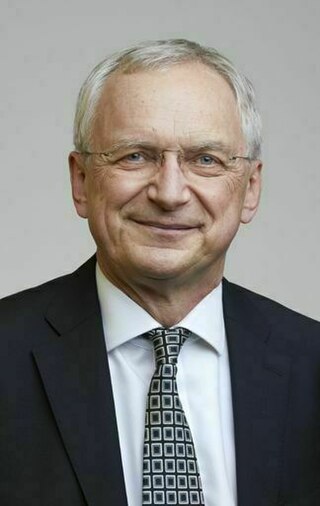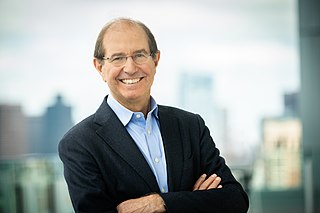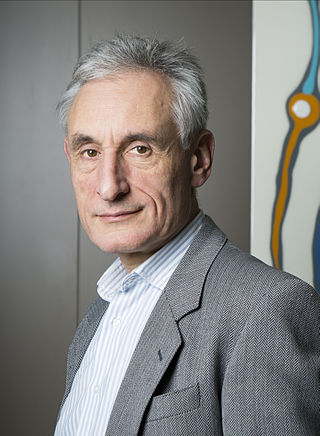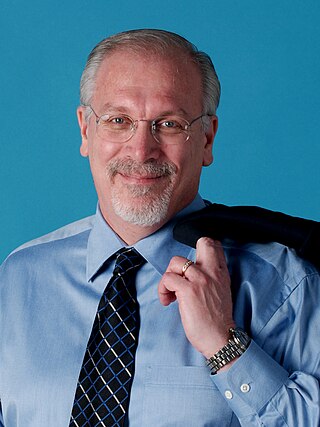Related Research Articles

Alan Curtis Kay is an American computer scientist best known for his pioneering work on object-oriented programming and windowing graphical user interface (GUI) design. At Xerox PARC he led the design and development of the first modern windowed computer desktop interface. There he also led the development of the influential object-oriented programming language Smalltalk, both personally designing most of the early versions of the language and coining the term "object-oriented." He has been elected a Fellow of the American Academy of Arts and Sciences, the National Academy of Engineering, and the Royal Society of Arts. He received the Turing award in 2003.

Arthur John Robin Gorell Milner was a British computer scientist, and a Turing Award winner.

Sir Maurice Vincent Wilkes was an English computer scientist who designed and helped build the Electronic Delay Storage Automatic Calculator (EDSAC), one of the earliest stored program computers, and who invented microprogramming, a method for using stored-program logic to operate the control unit of a central processing unit's circuits. At the time of his death, Wilkes was an Emeritus Professor at the University of Cambridge.

The Department of Computer Science at the University of Manchester is the longest established department of Computer Science in the United Kingdom and one of the largest. It is located in the Kilburn Building on the Oxford Road and currently has over 800 students taking a wide range of undergraduate and postgraduate courses and 60 full-time academic staff.

The School of Informatics is an academic unit of the University of Edinburgh, in Scotland, responsible for research, teaching, outreach and commercialisation in informatics. It was created in 1998 from the former department of artificial intelligence, the Centre for Cognitive Science and the department of computer science, along with the Artificial Intelligence Applications Institute (AIAI) and the Human Communication Research Centre.

Sir Andrew Hopper is a British-Polish computer technologist and entrepreneur. He is Chairman of lowRISC CIC, a Commissioner of the Royal Commission for the Exhibition of 1851, former Treasurer and Vice-President of the Royal Society, Professor Emeritus of Computer Technology at the University of Cambridge, an Honorary Fellow of Trinity Hall, Cambridge and Corpus Christi College, Cambridge.

Silvio Micali is an Italian computer scientist, professor at the Massachusetts Institute of Technology and the founder of Algorand, a proof-of-stake blockchain cryptocurrency protocol. Micali's research at the MIT Computer Science and Artificial Intelligence Laboratory centers on cryptography and information security.

Faron George Moller is a Canadian-born British computer scientist and expert on theoretical computer science, particularly infinite-state automata theory and temporal logic. His work has focussed on structural decomposition techniques for analysing abstract models of computing systems. He is founding director of the Swansea Railway Verification Group; Director of Technocamps; and Head of the Institute of Coding in Wales. In 2023, he was elected General Secretary of the Learned Society of Wales.
The British Colloquium for Theoretical Computer Science (BCTCS) is an organisation, founded in 1985, that represents the interests of Theoretical Computer Science in the UK, e.g. through representation on academic boards and providing commentary and evidence in response to consultations from public bodies. The BCTCS operates under the direction of an Organising Committee, with an Executive consisting of a President, Secretary and Treasurer. The current President is Barnaby Martin.

Francis Patrick Kelly, CBE, FRS is Professor of the Mathematics of Systems at the Statistical Laboratory, University of Cambridge. He served as Master of Christ's College, Cambridge from 2006 to 2016.

Andrew Blake is a British scientist, former laboratory director of Microsoft Research Cambridge and Microsoft Distinguished Scientist, former director of the Alan Turing Institute, Chair of the Samsung AI Centre in Cambridge, honorary professor at the University of Cambridge, Fellow of Clare Hall, Cambridge, and a leading researcher in computer vision.
Ian Pratt is a British computer scientist. He was the chief architect of the open-source Xen project, and chairman of Xen.org. He was also the founder of XenSource, the company behind Xen project. After XenSource was acquired by Citrix, he became vice president of Advanced Virtualization Products at this company, until leaving in 2011. He then became the CEO of Bromium. Bromium was eventually acquired by HP Inc in 2019, and he became the Global Head of Security at HP.
Professor Stanley J. Gill was a British computer scientist credited, along with Maurice Wilkes and David Wheeler, with the invention of the first computer subroutine.

Richard Allan DeMillo is an American computer scientist, educator and executive. He is Professor and holds the Charlotte B. and Roger C. Warren Chair in Computing at the Georgia Institute of Technology.
Michael Ralph Fellows AC HFRSNZ MAE is a computer scientist and the Elite Professor of Computer Science in the Department of Informatics at the University of Bergen, Norway as of January 2016.

Cliff Joslyn is an American mathematician, cognitive scientist, and cybernetician. He is the Chief Knowledge Scientist at the Pacific Northwest National Laboratory in Seattle, and visiting professor of systems science at Binghamton University.

Kamal Sarabandi is an Iranian-American scientist and the Fawwaz T. Ulaby Distinguished University Professor of EECS and the Rufus S. Teesdale endowed Professor of Engineering at the University of Michigan, where he teaches and conducts research on the science and technology of microwave and millimeter wave radar remote sensing, wireless technology, electromagnetic wave propagation and scattering, metamaterials, antenna miniaturization, and nano antennas.

Sir John Michael Brady is an emeritus professor of oncological imaging at the University of Oxford. He has been a Fellow of Keble College, Oxford, since 1985 and was elected a foreign associate member of the French Academy of Sciences in 2015. He was formerly BP Professor of Information Engineering at Oxford from 1985 to 2010 and a senior research scientist in the MIT Computer Science and Artificial Intelligence Laboratory (CSAIL) in Cambridge, Massachusetts, from 1980 to 1985.
Bonnie Jean Dorr is an American computer scientist specializing in natural language processing, machine translation, automatic summarization, social computing, and explainable artificial intelligence. She is a professor and director of the Natural Language Processing Research Laboratory in the Department of Computer & Information Science & Engineering at the University of Florida. Gainesville, Florida She is professor emerita of computer science and linguistics and former dean at the University of Maryland, College Park, former associate director at the Florida Institute for Human and Machine Cognition,, and former president of the Association for Computational Linguistics.

The University College of Science, Technology and Agriculture are two of five main campuses of the University of Calcutta (CU). The college served as the cradle of Indian sciences by winning the Nobel Prize in Physics in 1930 and many fellowships of the Royal Society London.